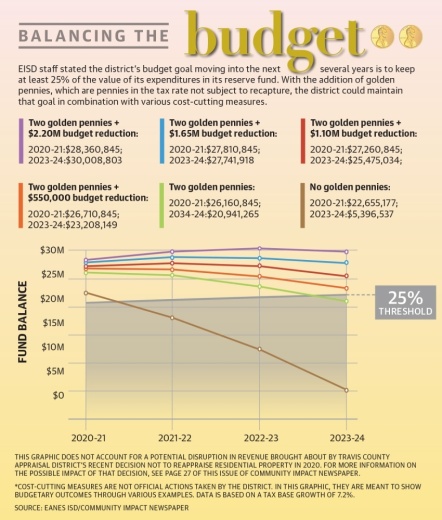According to Eanes ISD officials, an allowance brought about by new state legislation is going to go a long way toward keeping the district in a good financial position. The trick now is getting taxpayers to buy into the idea.
EISD officials have often indicated that Texas’ school finance bill, House Bill 3, provided the district with significantly less financial assistance than neighboring districts in Central Texas. As one example, for every dollar allocated to staffing EISD received, Lake Travis ISD received seven, according to EISD Chief Financial Officer Chris Scott.HB 3 is a state law passed last June that, among other aspects, is designed to equalize funding among Texas’ school districts. Scott said it is a major reason EISD is facing a $2.3 million budget deficit for the 2019-20 school year, and that is a trend that is expected to continue if the district does not take action.**
Enter the concept of golden pennies.Under HB 3, districts are allowed a maximum of eight golden pennies, which are pennies within a Texas school district’s maintenance and operations, or M&O, tax bill that cannot be subject to state recapture.
Texas’ recapture system was enacted in 1993 and requires districts with a value per student higher than $514,000 to contribute payments based on their taxable value, according to The Texas Education Agency. The money is collected by Texas’ education fund and redistributed to districts below that threshold.EISD has six golden pennies—the amount permitted prior to eased restrictions from HB 3—and they represent $0.06 of EISD’s total tax rate of $1.13 per $100 valuation. The EISD board broached the topic of adding two golden pennies during a Feb. 11 study session.
Scott said the addition of two golden pennies will not impact the district's portion of resident's taxes and because EISD is successfully paying off debt from various bonds dating back several years**, a shift in the tax rate formula focused on golden pennies could allow for additional funds.Because they are not subject to recapture, golden pennies are considered very valuable to districts, according to EISD Superintendent Tom Leonard, who added that of EISD’s $1 M&O portion of its tax rate, $0.60 is taken due to recapture.
EISD contributed $101.7 million, or 60% of its property taxes, to recapture for fiscal year 2018-19, and retained about $59.5 million, according to district information. Because golden pennies within the M&O rate cannot be touched by the state, Leonard said they are worth much more to the district than what he called the remaining “copper pennies.”“When the value of property goes up in our district, [the revenue from the golden pennies] is worth a lot,” Leonard said. “The 100 pennies are not worth as much; the 6 are worth a lot. Anything that's not subject to recapture is worth a lot.”
To obtain the golden pennies, EISD is required to call a voter approval tax rate election by Aug. 17 in order to meet the the Nov. 3 election day deadline. The district held a golden penny election in 2017, which was overwhelmingly passed by voters, according to Leonard, who said this allowed the district to retain an additional $3 million.“We suggested this to the voters; [in 2017-18] the voters understood it; and 89% voted in favor of it,” Leonard said. “Why? It lowered taxes, and we got more money locally.”
Leonard said the tax rate shift will enable EISD to increase golden pennies by two while lowering the interest and sinking rate by the same amount, showing no change in the overall rate.As the value of property grows in the district, the value of the pennies will also increase, according to Scott, who said he projects a tax rate base growth of about 7.2% per year.
“If we project that then next year those two additional golden pennies will be worth about $3.5 million for us, and the next year about $3.7 million,” Scott said.




